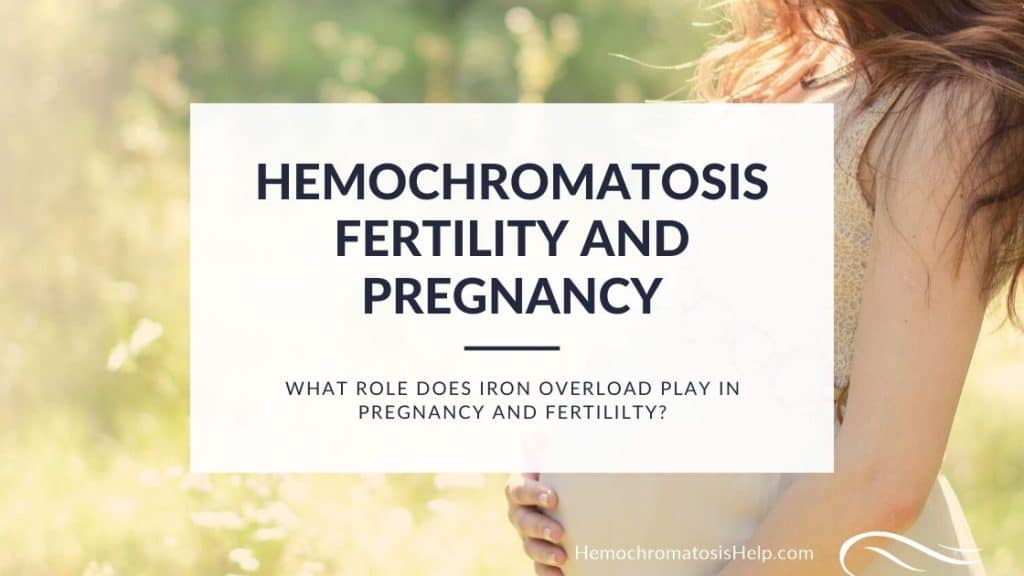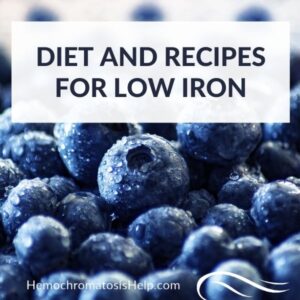Hemochromatosis: Pregnancy and Fertility
Many women do not learn that they have hemochromatosis until they are middle-aged, often after passing their childbearing years.
As I discussed in my article about hemochromatosis in women, the average age a woman begins to develop symptoms of hemochromatosis is 50.
However, as I also point out, this is not the case for all women. Some women learn about their iron overload in their 20s or 30s.
Younger women may have a relative who learns they have hereditary hemochromatosis, alerting the rest of the family to have their own genetics tested. This allows everyone to learn their status even before any symptoms start!
A woman may find her iron elevated if it is found incidentally as part of a routine blood panel.
Finally, even though she is not yet 50, women of all ages can start to develop symptoms of iron overload and discover her condition at that time.
Regardless of how she finds she has hemochromatosis, a younger woman will have to navigate her future healthcare choices, specifically related to pregnancy and fertility, with iron overload in mind.
Phlebotomy Treatment of Hemochromatosis During Pregnancy
Most sources suggest that when you are pregnant, it is wise to stop your regular phlebotomy. Pregnancy is an unusual state for your body in that you actively need more iron than your non-pregnant state (to help nourish the health and growth of your baby).
Even women with hemochromatosis can develop iron deficiency during pregnancy!
Hemochromatosis.org.uk suggests:
“While iron supplements should be avoided, iron deficiency is common and should be treated in a similar fashion to any other pregnant woman.
If ferritin is high then venesection should be delayed until you recover from childbirth unless there are haemochromatosis related liver and cardiac issues. Then you should seek advice from your consultant who should be able to give reassurance or develop a treatment plan.
Normal monitoring of mother and foetus should be sufficient but you should inform all medical staff involved in your pregnancy of your condition. In simple terms, you should be fine but if you have any worries, ask your doctors.”
If you do find that you need to take iron while pregnant, don’t fear! Follow your doctor’s instructions know that pregnancy isn’t forever.
Questions About Hemochromatosis Pregnancy Risks and Issues
So what happens if you want to become pregnant, or are pregnant, and you have hemochromatosis? How does this impact your pregnancy and how you need to think about iron?
The following are some commonly asked questions about the risks and issues surrounding hemochromatosis and pregnancy and fertility.
Will my baby have hemochromatosis too?
Great question. First, there is a rare newborn iron overload disease called neonatal hemochromatosis.
If you have type 1 hereditary hemochromatosis (the most common genetic form of hemochromatosis), you are not at increased risk of having a baby with neonatal hemochromatosis.
It is a completely different condition and your baby is not at risk because of your diagnosis.
Because you do have type 1 hemochromatosis, however, you likely carry at least one HFE gene that you might pass along to your children.
The good news is that in this situation, your child has many years to be tested, long before any symptoms of hemochromatosis would arise. He or she can take proactive steps to take care of their iron status while still young, way before any symptoms develop or organs are damaged.
Hemochromatosis, when managed and kept under control before organ damage occurs, has an excellent prognosis.
Will being pregnant help my body by reducing my stores of iron because of blood loss?
This is a popular theory that being pregnant and giving birth leads to an overall loss of iron that is good for your hemochromatosis and iron overload status. It reminds me a bit of the theory about menopause and hemochromatosis discussed in my article on women.
In pregnancy, a woman’s iron metabolism changes significantly, as her baby requires a large amount of iron to be healthy.
Labor and delivery also come with a great deal of blood loss.
So on the surface, it seems as if having children may spare a woman from the symptoms of iron overload or delay the onset of symptoms.
However, although pregnancy lowers a woman’s iron levels temporarily, this does not seem to have a significant effect throughout a woman’s life to impact iron overload.
Over time, women who have given birth to children still express symptoms of too much iron in the blood.
The only study I could find looking at this topic looks at mice and not humans. Nevertheless, it suggests that pregnancy really doesn’t seem to affect long term iron overload as much as one might theorize.
In the study “Hemochromatosis and pregnancy: iron stores in the Hfe-/- mouse are not reduced by multiple pregnancies,” researchers looked at iron-overloaded mice and compared those who had never given birth to those who had had lots of mice babies. They concluded that “multiple pregnancies do not reduce body iron” in mice with the HFE gene.
Does hemochromatosis cause infertility or cause miscarriage?
I’ve poured through medical research databases, searching for studies covering this topic. As of yet, there are no research studies that I can find to answer if hemochromatosis impacts fertility or causes miscarriage.
If, however, I visit online forums frequented by hemochromatosis sufferers, the same story shows up over and over: “I have hemochromatosis. I’ve had a miscarriage (or multiple miscarriages),” followed by other women chiming in, “Me too.”
Is there something to this? Does iron overload contribute to infertility or miscarriage?
Anecdotal stories suggest a possible link between hemochromatosis and infertility and miscarriage. Unfortunately, no one has fully explored this question in the medical research community.
Further Research Needed
Clearly, more research needs to be done exploring hemochromatosis and its impact on pregnancy and fertility.
It does seem like pregnancy may temporarily reduce the iron level of a woman (even potentially to the point of anemia). However, this effect does not seem to confer any long-term benefit to overall iron stores in a woman’s body.
Hemochromatosis symptoms in women occur, on average, in a similar time frame to men, indicating that the blood loss from menses, pregnancy, and childbirth does not affect the long term progression of too much iron in any meaningful way.
Therefore, it’s essential that women with hemochromatosis who wish to become pregnant, or who have already had children, make sure to speak with their doctor on an ongoing basis to ensure proper care for iron overload.
- Moirand R, Adams PC, Bicheler V, Brissot P, Deugnier Y. Clinical features of genetic hemochromatosis in women compared with men. Ann Intern Med. 1997 Jul 15;127(2):105-10. PubMed PMID: 9229998. http://www.ncbi.nlm.nih.gov/pubmed/9229998
- Neves JV, Olsson IA, Porto G, Rodrigues PN. Hemochromatosis and pregnancy: iron stores in the Hfe-/- mouse are not reduced by multiple pregnancies. Am J Physiol Gastrointest Liver Physiol. 2010 Apr;298(4):G525-9. Doi: 10.1152/ajpgi.00449.2009. Epub 2010 Jan 28. PubMed PMID: 20110460. http://www.ncbi.nlm.nih.gov/pubmed/20110460




